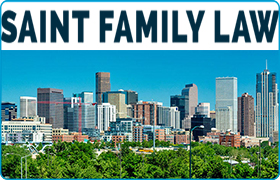 Brighton Child Custody Lawyers, Colorado
Brighton Child Custody Lawyers, Colorado
Sponsored Law Firm
-
 x
x

Click For More Info:
-
Saint Family Law
7200 E. Dry Creek Road, Suite G-205, Centennial, Colorado 80112» view mapDivorce & Family Law Experienced And Aggressive Representation
Randy Saint Onge and his team works diligently with each client to learn what their priorities are to develop a comprehensive litigation strategy.
800-879-6811
Includes: Guardianships & Conservatorships, Custody & Visitation
Sponsored Lawyers
1-10 of 16 matches
Family Law, Divorce, Divorce & Family Law, Child Custody
Katherine Jane Jenkins is a long-established business, founded in 2001, serving the Denver, CO region and its surrounding areas. With close to two decades of experience in the industry, Katherine Jane Jenkins has earned a reputation for providing top-notch services. The company's dedication to customer satisfaction is demonstrated by its enduring presence in the regional market.
(more)Family Law, Bankruptcy, Divorce, Child Custody, Collection
John has been practicing law in Colorado since 1998. He is the founding member of Eckelberry Law Firm, established in 2006, in charge of the family law and bankruptcy practice for the firm. During his almost 20 years of practice, John has helped hundred of clients achieve personal and financial “fresh starts,” while developing short- and long-term life plans.
(more)Divorce & Family Law, Divorce, Family Law, Child Custody, Child Support
Welcome to the law firm of Adam W.G. Moore. I am a solo practitioner providing strong, solid legal representation in all Colorado divorce and family law matters, to those who need it. I grew up in a family of attorneys. My grandfather, Carlos Cadena, argued several times before the United States Supreme Court and my mother, Mary Elizabeth Galvan, is a prominent attorney in Laramie, Wyoming. After graduating from the University of Wyoming College of Law, I worked for a large downtown Denver family law firm, where I gained experience handling divorces and marital estates comprising millions of dollars in assets. I learned early on that Family law requires a special touch. I use a balanced approach, treading lightly tender emotions, but pressing aggressively when necessary. From experience, I know when to compromise and when to press forward in pursuit of my clients’ interests. From your free initial consultation to the final disposition of your case, I, not a paralegal or assistant, will personally communicate with you and handle your case. You will never be treated as a name in a sea of other clients. I strive to give clients the personalized and responsive service they need. I will take the time to understand your issues and explain your rights.
(more)Family Law, Divorce, Child Custody, Child Support
Fred A. Dunsing attended law school after employment in the E&C, software, and manufacturing industries. He attended school at night while working full-time during the day. Even though he attended school at night, he managed to gain a significant amount of client representation and trial experience through the Student Law Office operated by the University of Denver and sanctioned under Colorado law.{newline}{newline}After graduation, Fred practiced mainly in the areas of business organizations, criminal defense, civil litigation and family law. Fred currently maintains a litigation practice and limits that practice to family law, which he has done for nearly 20 years. Fred’s family law practice includes the areas of divorce, legal separation, annulments, child custody disputes, property settlements, post-decree modifications, paternity and visitation, grandparent rights, and (pre)marital agreements. Fred is rated “AV-Preeminent” by Martindale Hubbell, which is the highest rating an attorney can receive.{newline}{newline}Fred strives to find cost-effective solutions for clients during negotiations, in litigation, or on appeal. It is his goal to provide personal service at a reasonable cost, and Fred most enjoys the opportunity to help Colorado families through difficult times.
(more)


 Randy St. Onge Engelwood, CO
Randy St. Onge Engelwood, CO AboutSaint Family Law
AboutSaint Family Law Practice AreasSpecializations
Practice AreasSpecializations




